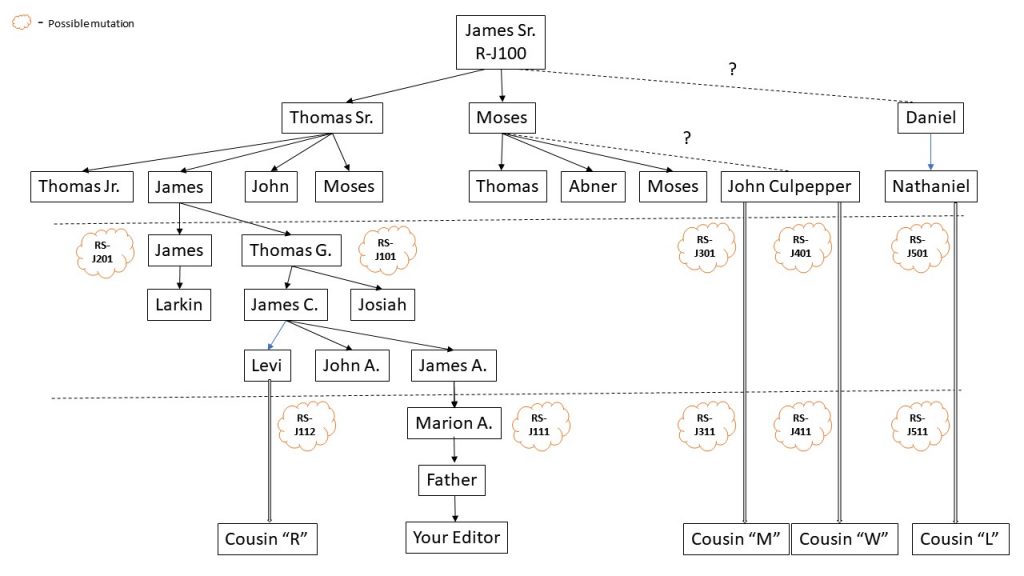I have uncovered various hints about James’ lineage. Based on the last name “Wilson” we can surmise that he was likely of Scottish or English heritage. According to Houseofnames.com, Wilson first emerged as a Scottish clan name in the northern Scotland territory of Berwick, where the family first settled. They are supposedly descended from Will the Crowner Gunn who in turn traced his lineage to the Earls of Orkney. The latter were Vikings who arrived there about 895 AD. Personally, I take such detailed origin information with a grain of salt, although my father’s current DNA estimate of about 34% Scottish indicates there could be a grain of truth here (no pun intended).
Wilsons also moved south into England when the Scottish border clans were disbanded in 1603. And of course, with the common name of Wilson being likely derived from “Son of Will”, it would have popped up many time across unrelated lines in numerous countries before the general formalization of surnames.
Wilsons did comprise a significant percentage of the Scots that moved to Ulster, Ireland as part of the Plantation effort by King James I to displace the Catholic Irish with Protestants. Once again according to houseofnames.com, “Wilson is by far the most numerous English [language] surname in Ireland”. Ulster Scots, whom we now tend to refer to as Scotch-Irish in the United States, migrated in droves to America in the late 17th and early 18th centuries, seeking to escape famine and religious discrimination. It is that group to which believe our James Sr. belonged.
We have several good DNA connections to Scotland and Ireland. In one case, we have a shared segment on Chromosome (Chr) 3 with a researcher who has a tree with a direct male Wilson line back to Scotland. The segment is on an area that is also common with others who are either related to our Virginia Wilsons, or who have ancestors that lived in the same area of Virginia at the same time. As such, it is a fairly weak link but it does provide a significant clue. However, we have two much stronger FTDNA Y-67 matches: a Brabazon and a O.’Brollaghain still in Ireland, both descended from Brabazon men in Ulster. Although it is harder to determine time to MRCA (Most Common Recent Ancestor) with the STR tests than Big-Y SNPs, they are both with the same range (1-5 differences) as known descendants of Moses Wilson, son of James. I have corresponded with an unrelated Brabazon researcher who confirms there are Wilson-Brabazon names in the old Ulster records, and based on history in the region is fairly sure that a Wilson male took the Brabazon name at about the same time as our Wilson line emigrated to America (early to mid-1700’s). One reason for the name change might be an inheritance from the Brabazon side, or a marriage into a Brabazon family. Given the conditions at the time, with suppression of non-Anglican Protestants by the British government, trade restrictions on traditional Scottish exports, and famine, it wouldn’t be a stretch to imagine a man giving up the family name in favor of wealth and social acceptance.
Given that, I’m now actively pursuing possible paths from Ireland for our Wilsons into the Henry County area. The most logical route would be the well-traveled Great Wagon Road that many Scotch-Irish took into Virginia and the Carolinas – indeed, the road passed right through what became Henry County after breaking back east through the Blue Ridge Mountains in southern Augusta County. There were a number of Wilsons in Augusta in the mid-1700’s and many (unsubstantiated and undocumented) family trees link our James to that County. But I need to see some direct evidence placing him there. We also have a possible link to Culpeper County (courtesy of John C. Wilson’s middle name), which is on the east side of the Appalachians and not directly on the Great Wagon Road. But that doesn’t mean we have to rule out that area — it’s entirely possible James and his family took a more easterly route into Henry County. However, I have been looking into that connection (such as in Fairfax and Prince William Counties) for quite some time and can’t find a good linkage. So, more work in Augusta County it is…
By the way, here is an interesting “mystery” to ponder. One common Scottish naming convention has the first son named after his paternal grandfather, and the 2nd after the maternal grandfather. Certainly that could fit with James presumed-eldest son Thomas, which is a common Scottish name. But his next son was Moses! Correct me if you think otherwise, but this doesn’t seem like a good Scottish name to me. But perhaps followed the “standard” naming scheme and Moses was the father of Martha, James’ wife. Not only did Moses have a son and grandsons with his name, but a Moses’ also appeared on Thomas’ side, which supports the idea of it being a family name. For a short time, I entertained the fanciful possibility that Moses was born ship-board enroute to America, and thus was named as being “of the water”. However the numerous occurrences of Moses with the entire family belies such a rather far-fetched notion. Anyway, looking for a possible marriage of James into a non-Irish, Moses-led family might be a fruitful pursuit!







